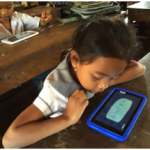
In the Technology for Education Systems Transformation (TEST) project, World Education developed, tested, and implemented a digitized and automated early-grade reading formative assessment. The application, known as the TEST app, improves upon the previous pencil-and-paper version of the formative assessment by increasing…

In the Technology for Education Systems Transformation project (TEST) project, World Education developed, tested, and implemented a digitized and automated early-grade reading assessment. The benchmarks and assessments used for the TEST app were developed by the Total Reading Approach for…
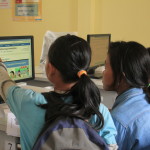
In Cambodia, rates of youth migration are high, as youth leave their families and home communities in search of job opportunities. Current data shows that less than 35% of adolescents are enrolled in lower secondary school, and that many are…
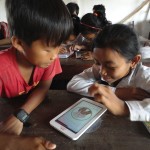
Youth on the Move (YOTM) is World Education’s regional initiative aiming to reduce the vulnerability of potential migrant, and migrant, youth to trafficking, exploitation and abuse through improved learning outcomes, life skills, and knowledge about safe migration. Faced with poor…
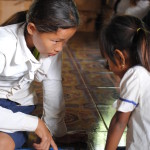
In 2012, World Education, Inc. (WEI) was awarded a grant to implement the innovative Total Reading Approach for Children (TRAC) project (October 2012-September 2014) under the All Children Reading Grand Challenge, a consortium of donors including USAID, World Vision, and…
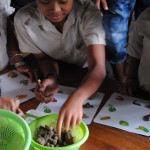
The Improved Basic Education in Cambodia project (IBEC) was a major education development project supported by USAID during the period of 2009-2014, with a budget of $10 million. The project was implemented by World Education as the prime contractor and…
Chronic poverty, landlessness, depletion of resources, lack of year-round employment, debt, and national disasters prompt many young Cambodians living in rural areas to migrate to Phnom Penh each year. Many of these youth – particularly young women – become garment…
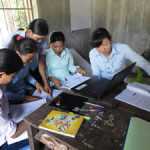
More than 50% of Cambodia’s population is under the age of 18, and only about one-third of which completes Grade 9. As a consequence, many youth do not develop the skills, behaviors, and support networks that are necessary to attain…
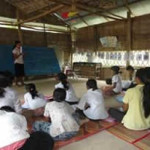
The Pre-Industry Life Skill (PILS) Program was designed to provide opportunities for vulnerable young women aged 15-24, who have expressed the intention to leave their home villages in search of economic opportunities, particularly in garment factories in urban areas. Supported…
Systems that enable governments and organizations to monitor and evaluate ongoing activities are critical to ensuring program effectiveness and quality. With support from UNICEF, World Education, in partnership with John Snow, Inc. (JSI), developed a monitoring and evaluation (M&E) system to monitor,…
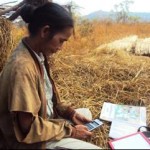
Acquisition of functional literacy is a crucial step in the process of improved livelihoods and alleviation of poverty. In and around the Seima Protection Forest (SPF), a World Education study in 2009 revealed that illiteracy and innumeracy are significant barriers…
The Happy School (also known as Children for a Better Future) is a local nongovernmental organization (NGO) located in Phnom Penh which targets children of families in the poorest suburbs of the city who are vulnerable to unsafe labor, migration,…
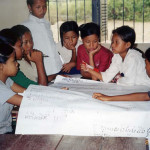
The Sports Diplomacy Project (SDP) aimed to reduce the presence of social dangers among ethnically mixed populations and promote community participation and improvements to the school environment through the construction of sports facilities, outreach awareness, and social events. The project…
World Education was contracted by the Ministry of Education, Youth and Sport’s Cambodia Education Support Project (CESSP) to undertake a qualitative evaluation of its progress and impact. The aim of CESSP was to expand access to education services by addressing…
The Schools for Life (SFL) Program, funded by USAID, expanded on the good practices and lessons learned from the 3 ½-year Educational Support for Children in Underserved Populations (ESCUP) Program. The project continued to address the issues of access and quality…
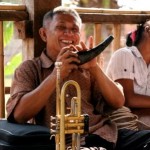
Cambodian Living Arts (CLA)—formerly known as the Cambodian Master Performers Project (CMPP)—was founded in 2000 by Arn Chorn-Pond, a Cambodian-American refugee who was featured in the Emmy-nominated movie, The Flute Player. A World Education project from 2001 – 2009, CLA worked…
The Cambodia Educational Media Initiative (CEMI) promoted the use of a range of media to strengthen efforts in Cambodia to promote quality education for youth of all ages. The Initiative brought together two institutions with a strong commitment to building…
Although the right to a basic education is guaranteed to every Cambodian child in the country’s constitution, there continues to be a considerable gap between official policy and reality. The Educational Support for Children of Underserved Populations (ESCUP) Program, funded…
A significant number of Cambodia’s youth face difficulties with poverty, unstable home lives, substance abuse problems, and other factors that lead too many of them to a life on the streets. For many of these children, the lack of stability…
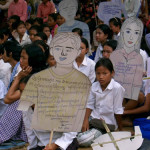
Cambodia serves as a country of origin, transit, and destination for both domestic and international trafficking networks. Girls and women are easy targets for traffickers, unaware of the dangers that lurk behind promises of good employment. They are a living…











